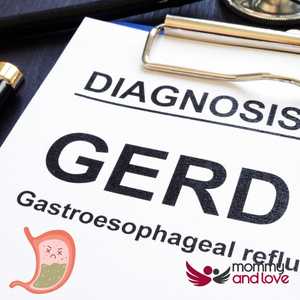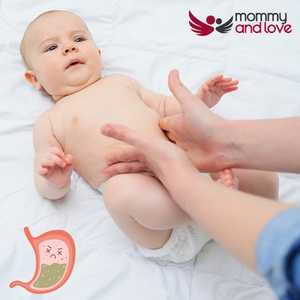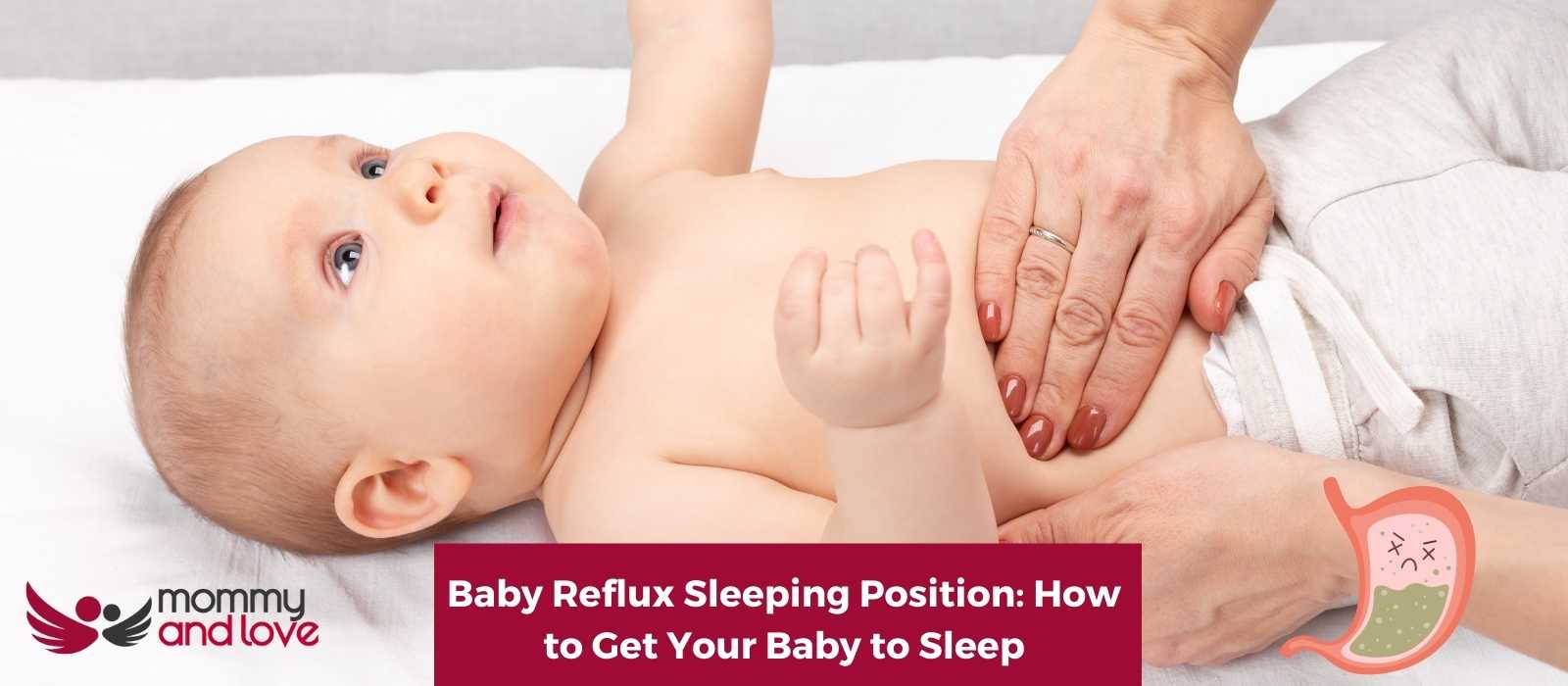Do you have a baby that is struggling with reflux? Are you finding it hard to get them to sleep through the night? If so, you are not alone. Many parents struggle with this issue.
A newborn baby with reflux should sleep on her back which is considered the safest sleep position for babies. This sleep position is also called the supine position. Never put baby in an inclined position to sleep.
How Do You Know the Baby Has Acid Reflux?

GERD (gastroesophageal reflux disease) or acid reflux diagnosis can be done in a number of ways.
One way is through a physical examination. Your doctor will likely start by asking about your baby’s symptoms and medical history. He or she will then do a physical examination, paying close attention to your baby’s abdomen and chest. It also helps determine the root cause of this condition.
Another way to diagnose acid reflux is through tests. These may include an upper GI series (UGI), in which X-rays are taken of the upper digestive tract, or pH monitoring, in which a small tube is placed in the esophagus to measure the amount of stomach acids present.
Most babies outgrow their reflux by age 12 months of age. However, reflux may persist in other babies and it’s extremely important to know what the symptoms are of this condition for treatment.
What Are the Symptoms of Infant Reflux or Gerd?

The symptoms of infant reflux or GERD can vary from baby to baby.
Some babies with reflux may experience occasional spitting up or vomiting, while others may have more frequent and severe episodes.
Common symptoms of infant reflux or GERD include:
- frequent spitting up or vomiting
- crying during feedings
- arching the back during feedings
- refusing to eat or eating only small amounts
- fussiness or irritability
- poor weight gain
- sore throat or hoarse voice
- poor sleep patterns or sleep deprivation
If your baby is experiencing any of these signs, it’s important to talk to your pediatrician. In rare cases of severe reflux, a medication depending on your baby’s age might be needed and they will recommend a few lifestyle changes.
Why Does Gerd or Reflux Interfere With Baby Sleep?
Babies with GERD or reflux often have trouble sleeping. The reason is that when they lie down, the acid in their stomachs can more easily move up into their throats and mouths. This can cause pain and discomfort, making it hard for babies to sleep through the night.
There are other reasons why GERD or reflux can interfere with a baby’s sleep.
First, when acid and spit-up come up into the esophagus (food pipe), it can cause discomfort and pain. This can make it difficult for your baby to fall asleep and stay asleep.
Additionally, GERD can cause respiratory problems, which can also disrupt sleep.
Finally, GERD can lead to poor feeding and weight gain, which can also impact sleep.
How Can I Help My Infant With Reflux Sleep Better?
If your infant has reflux/GERD, you may find that their sleep is interrupted by periods of discomfort. There are a few things you can do to help your baby sleep more comfortably:
Keep a food journal and sleep logs of your baby’s feeding times and periods of discomfort during sleep hours.
This will help you identify any patterns that may be causing the reflux/GERD.
Certain foods may be causing your babies reflux to get worse. A food log can help you and your baby’s doctor identify any patterns between your baby’s discomfort and what they have eaten. This information can be used to make dietary changes that may help reduce or eliminate your baby’s reflux.
Sleep logs can help you track how well your infant is sleeping and identify any potential triggers for night-time reflux episodes. By keeping track of these things, you and your baby’s doctor can work together to find the best way to help your infant sleep comfortably and without interruption.
Hold baby upright after feedings to help them digest.
You can also try burping them frequently during and after each breastfeeding or bottle feeding.
When a baby is lying down, gravity isn’t working in their favor. Lying down makes it easier for the icky stuff in their tummies to come back up. But when you hold them upright, gravity does its job and keeps everything where it should be – inside their stomachs!
Parents should also try to keep their babies upright position for at least 30 minutes after feedings. Never let them lie down immediately after eating. Wait at least half an hour.
Never Elevate the head of their crib or bassinet by placing a firm pillow under the mattress.
Many parents have been told to elevate their heads while sleeping to help with reflux.
However, you should never do this. The American Academy of Pediatrics (AAP) doesn’t recommend the use of sleep positioners or elevating as you can put your baby at more risk of sids from sliding into an unsafe sleeping position.
Parents should try to wean their babies away from sleep associations as they grow.
This means not letting them fall asleep while being held or nursed, for example. Try to put them down in their crib when they are drowsy but still awake.
Try infant massage or rocking to soothe their tummy pains.

Infant massage has been shown to be helpful in relieving reflux/GERD. The gentle pressure on the stomach can help to reduce the amount of acid that is produced. Additionally, the rhythmic movements can help to soothe and relax the baby.
Rocking is another effective way to help a baby with reflux sleep better at night. The gentle movement can help to ease stomach pains and also provide a calming effect.
Both infant massage and rocking are great ways to help your baby get some much-needed relief from their reflux/GERD.
Try out these techniques and see if they help your baby get some much-needed relief and a better night’s sleep.
Make sure they’re wearing loose, comfortable clothing that won’t put any extra pressure on their tummy.
Wearing loose clothing doesn’t put any extra pressure on your baby’s tummy. This can help reduce the amount of stomach acid that rises up into their esophagus, which is what causes the pain and discomfort associated with reflux and GERD.
Another benefit of loose clothing is that it helps your infant feel more comfortable. And when they’re comfortable, they’re more likely to sleep through the night. So if you want to help your infant with reflux/GERD sleep better at night, make sure they’re wearing loose, comfortable clothing. It could make all the difference for your baby and the whole family.
Other things you can do include:
- Walking around while wearing baby outside for a walk before sleeping time to help your baby sleep easier.
- Consider doing small frequent feedings. Some babies might want frequent feeding because more milk going down is comforting.
- Adjust the nipple size of your baby’s feeding bottle.
- Sleeping in the same room as your baby while she sleeps.
- Don’t push tummy time if your baby is uncomfortable.
- Give your infants their last feeding for the day earlier than usual to allow more digestion time.
How Do You Position Reflux Babies for a Good Baby’s Sleep?
The best position for an older baby with reflux is upright. This allows gravity to help keep the stomach contents where they belong — in the stomach. You can hold your baby upright during feedings or after meals.
Positioning your infants upright during and after feedings may help with GERD.
But don’t put pillows under your baby’s head while he or she sleeps. This could put your baby in an unsafe position and increase the risk of SIDS.
The Bottom Line on Sleeping with Reflux
Though reflux is common and usually harmless, it can cause discomfort for your infants.
- NEVER elevate your babies head and chest while she sleeps.
- Leave it 30 minutes after feeding before putting them to sleep
- Its better to feed them little and often rather than bigger meals which their stomachs struggle to digest.
- Hold them upright for about 20 minutes after each feed to help them, burping them continually.
- Check the nipple size is appropriate if bottle feeding.
FAQ on Babies Sleeping with Reflux
Does Gripe Water Help With Reflux?
There is no scientific evidence to support the claim that this water can help with reflux in most babies. However, some parents report that their babies find relief from symptoms after using this water.
Do Pacifiers Help With GERD?

Yes, sucking on pacifiers can help with reflux according to research published on PUbmed.gov
This study showed that babies who used pacifiers had less reflux and the reflux they had was milder.
This may be because the sucking action caused more saliva which helped the baby’s stomach break down the acid reflux.
What Is Silent Reflux?
Silent reflux, also called laryngopharyngeal reflux (LPR), is a type of gastroesophageal reflux disease (GERD). It occurs when stomach acid and other contents of the stomach flow back up into the esophagus. This can lead to symptoms such as heartburn, chest pain, trouble swallowing, and a bitter taste in the mouth. Silent reflux can also cause hoarseness, sore throat, cough, and other symptoms.
Silent reflux or LPR is different from GERD because it often does not cause heartburn or indigestion. This is because LPR occurs when stomach acid flows back up into the esophagus and throat, irritating the delicate tissues there. Many people with LPR do not know they have it because they do not have heartburn.

This article was written by: Gian MIller – Full-Time Writer, Baby Whisperer & Dad of 3.
Gian spends a lot of his time writing. A self-proclaimed baby whisperer, Gian has been through it all with his own children and is passionate about sharing his hard-won wisdom with other parents. When he’s not writing or changing diapers, you can find him playing the guitar or watching baseball (or preferably both at the same time).




